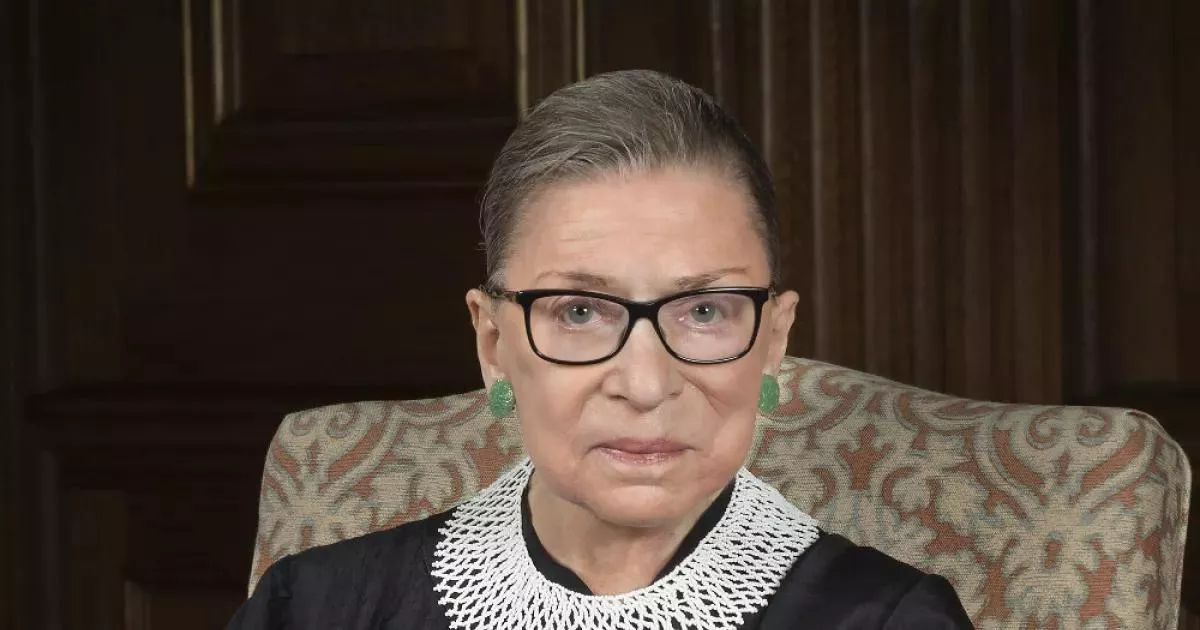Ruth Bader Ginsburg was an American lawyer and Supreme Court Justice from 1993 until her death in 2020. Appointed by President Bill Clinton, she was the second woman and first Jewish woman to serve on the Court. Initially viewed as a moderate, she authored key majority opinions like United States v. Virginia. Later, her passionate dissents on the Court's rightward shift gained her the popular nickname "the Notorious R.B.G." Ginsburg became a cultural icon, admired for her sharp legal mind and unwavering commitment to gender equality and civil rights.
March 15, 1933: Ruth Bader Ginsburg's Birth
On March 15, 1933, Joan Ruth Bader, later known as Ruth Bader Ginsburg, was born. She went on to become an American lawyer and jurist, serving as an associate justice of the Supreme Court of the United States.
1953: Rightward Shift in the Supreme Court
Since 1953, there have been major rightward shifts in the Court following appointments to replace justices.
June 23, 1954: Graduation from Cornell University
On June 23, 1954, Ruth Bader graduated from Cornell University with a Bachelor of Arts degree in government, marking the culmination of her undergraduate studies.
1955: Birth of First Child
In 1955, Ruth Bader Ginsburg gave birth to her first child, adding to her responsibilities as a young mother and impacting her early career.
1956: Enrollment at Harvard Law School
In 1956, Ruth Bader Ginsburg enrolled at Harvard Law School, where she was one of only a few women in her class. She faced gender-based questioning and challenges during her time there.
1959: Graduation from Columbia Law School
In 1959, Ruth Bader Ginsburg earned her law degree from Columbia Law School, tying for first in her class, after transferring from Harvard and becoming the first woman on two major law reviews.
1960: Rejection by Justice Frankfurter
In 1960, Ruth Bader Ginsburg was rejected for a clerkship by Supreme Court Justice Felix Frankfurter due to her gender, despite a strong recommendation, highlighting the gender-based challenges she faced early in her career. Later that year she began clerking for Judge Palmieri.
1961: Research Associate at Columbia Law School
From 1961, Ruth Bader Ginsburg served as a research associate at the Columbia Law School Project on International Procedure, contributing to her growing expertise in law.
1963: Associate Director at Columbia Law School
In 1963, Ruth Bader Ginsburg became the associate director of the Columbia Law School Project on International Procedure, indicating her increasing prominence in legal scholarship.
1963: Professor at Rutgers Law School
In 1963, Ruth Bader Ginsburg began her career as a professor at Rutgers Law School, marking her entry into academia. She was paid less than her male colleagues.
1964: Title VII of the Civil Rights Act
In 1964, Title VII of the Civil Rights Act was enacted, which was later central to the Ledbetter v. Goodyear case where Lilly Ledbetter sued for pay discrimination based on gender.
1965: Voting Rights Act of 1965
In 2013, Ginsburg dissented in Shelby County v. Holder, in which the Court held unconstitutional the part of the Voting Rights Act of 1965 requiring federal preclearance before changing voting practices.
1969: Justice Abe Fortas Resignation
In 1969, Justice Abe Fortas resigned, this made Ruth Bader Ginsburg the first Jewish justice since his resignation upon her appointment to the Supreme Court.
1969: Tenure at Rutgers Law School
In 1969, Ruth Bader Ginsburg received tenure at Rutgers Law School, acknowledging her contributions and solidifying her position in academia.
1969: Appointment of Warren Burger
In 1969, Warren Burger was appointed to replace Earl Warren.
1970: Co-founded Women's Rights Law Reporter
In 1970, Ruth Bader Ginsburg co-founded the Women's Rights Law Reporter, the first law journal in the U.S. to focus exclusively on women's rights, marking a significant step in her advocacy for gender equality.
1971: Reed v. Reed
In 1971, Ginsburg cited two German cases in her first argument before the Court, Reed v. Reed, advocating for the use of foreign law and norms to shape U.S. law.
1972: Argued Moritz v. Commissioner
In 1972, Ruth Bader Ginsburg argued before the 10th Circuit in Moritz v. Commissioner on behalf of a man who had been denied a caregiver deduction because of his gender.
1972: Professor at Columbia Law School
In 1972, Ruth Bader Ginsburg began teaching at Columbia Law School, becoming its first tenured woman and expanding her influence in legal education.
1972: Co-founded the Women's Rights Project at the ACLU
In 1972, Ruth Bader Ginsburg co-founded the Women's Rights Project at the American Civil Liberties Union (ACLU), solidifying her commitment to advocating for gender equality through legal channels.
1972: End of Professorship at Rutgers Law School
In 1972, Ruth Bader Ginsburg concluded her time as a professor at Rutgers Law School, after teaching mainly civil procedure and after having received tenure in 1969.
1973: Became General Counsel of the Women's Rights Project
In 1973, Ruth Bader Ginsburg became the General Counsel for the ACLU's Women's Rights Project, taking on a leadership role in advancing women's rights through legal advocacy.
1973: Argued in Frontiero v. Richardson
In 1973, as amicus, Ruth Bader Ginsburg argued in Frontiero v. Richardson, challenging a statute that made it more difficult for a female service member to claim increased housing allowance for her husband. The Supreme Court ruled in Frontiero's favor.
1973: Roe v. Wade Ruling
In 1973, the Supreme Court made its ruling on Roe v. Wade, 410 U.S. 113, which Ginsburg later criticized for terminating a nascent democratic movement to liberalize abortion laws, potentially hindering the development of a more durable consensus in support of abortion rights.
1973: Challenge to Involuntary Sterilization
In 1973, the same year Roe v. Wade was decided, Ruth Bader Ginsburg filed a federal case to challenge involuntary sterilization, suing members of the Eugenics Board of North Carolina on behalf of Nial Ruth Cox, a mother who had been coercively sterilized.
1974: Participation in Gender Discrimination Cases
By 1974, the Women's Rights Project and related ACLU projects had participated in more than 300 gender discrimination cases, demonstrating Ginsburg's and the organization's extensive efforts in this area.
1975: Argued in Weinberger v. Wiesenfeld
In 1975, Ruth Bader Ginsburg represented a widower denied survivor benefits under Social Security in Weinberger v. Wiesenfeld, arguing that the statute discriminated against male survivors of workers. The court ruled in her favor.
1976: Arguments Before the Supreme Court
Between 1973 and 1976, Ruth Bader Ginsburg argued six gender discrimination cases before the Supreme Court as the director of the ACLU's Women's Rights Project, winning five of them and strategically advancing gender equality law.
1976: Craig v. Boren Argument
In 1976, Ruth Bader Ginsburg filed an amicus brief and sat with counsel at oral argument for Craig v. Boren, challenging an Oklahoma statute that set different minimum drinking ages for men and women.
1977: Fellow at the Center for Advanced Study in the Behavioral Sciences
From 1977 to 1978, Ruth Bader Ginsburg was a fellow of the Center for Advanced Study in the Behavioral Sciences at Stanford University, enhancing her understanding of the intersections between law and behavior.
1978: End of Fellowship at the Center for Advanced Study in the Behavioral Sciences
From 1977 to 1978, Ruth Bader Ginsburg was a fellow of the Center for Advanced Study in the Behavioral Sciences at Stanford University, ending her fellowship.
1978: Omnibus Judgeship Act
In 1978, Congress passed the Omnibus Judgeship Act, which increased the number of federal judges by 117 in district courts and 35 in circuit courts. The law prioritized the inclusion of women and minority groups among the judges, aligning with President Jimmy Carter's agenda. The nomination process was also required to consider the character and experience of the candidates.
January 1979: Questionnaire for U.S. Court of Appeals
In January 1979, Ruth Bader Ginsburg completed questionnaires for potential nominations to the U.S. Court of Appeals for both the Second Circuit and the District of Columbia Circuit, marking a significant step towards her judicial career.
1979: Duren v. Missouri Argument
In 1979, Ruth Bader Ginsburg's last case as an attorney before the Supreme Court was Duren v. Missouri, challenging the validity of voluntary jury duty for women.
April 14, 1980: Nomination to U.S. Court of Appeals
On April 14, 1980, President Jimmy Carter nominated Ruth Bader Ginsburg to a seat on the DC Circuit of the U.S. Court of Appeals, filling the vacancy created by Judge Harold Leventhal's death.
June 18, 1980: Confirmation to U.S. Court of Appeals
On June 18, 1980, Ruth Bader Ginsburg was confirmed by the United States Senate and received her commission to serve on the DC Circuit of the U.S. Court of Appeals.
1980: Appointment to the U.S. Court of Appeals
In 1980, Jimmy Carter appointed Ruth Bader Ginsburg to the U.S. Court of Appeals for the District of Columbia Circuit, marking an important step in her judicial career.
1980: End of Professorship at Columbia Law School
In 1980, Ruth Bader Ginsburg concluded her time as a professor at Columbia Law School, after co-authoring the first law school casebook on sex discrimination and after teaching the first legal seminar on sex discrimination.
1980: Appointment to the Federal Bench
In 1980, Ruth Bader Ginsburg was appointed to the Federal Bench, marking the end of her work on the ACLU's Women's Rights Project.
1981: Roberts advises against Supreme Court nominees giving specific responses
In 1981, as a young attorney, John Roberts advised against Supreme Court nominees giving specific responses to questions during their confirmation hearings.
1985: Comparison to Thurgood Marshall
In 1985, former solicitor general Erwin Griswold compared Ruth Bader Ginsburg to Thurgood Marshall in a speech, recognizing her as the leading litigator for women's rights.
1990: Americans with Disabilities Act
In 1999, Ginsburg wrote the majority opinion in Olmstead v. L.C., in which the Court ruled that mental illness is a form of disability covered under the Americans with Disabilities Act of 1990.
1991: Appointment of Clarence Thomas
In 1991, Clarence Thomas was appointed to replace Thurgood Marshall.
June 22, 1993: Nomination to Supreme Court
On June 22, 1993, President Bill Clinton nominated Ruth Bader Ginsburg as an associate justice of the Supreme Court to fill the seat vacated by retiring Justice Byron White. She was recommended by Janet Reno, the U.S. Attorney General, and was seen as a moderate consensus-builder. Ginsburg became the first Jewish justice since 1969 and the second female justice.
August 3, 1993: Senate Confirmation
On August 3, 1993, the United States Senate confirmed Ruth Bader Ginsburg to the Supreme Court by a vote of 96-3.
August 5, 1993: Supreme Court Commission
On August 5, 1993, Ruth Bader Ginsburg received her commission as a Justice of the Supreme Court.
August 9, 1993: End of service on DC Circuit
On August 9, 1993, Ruth Bader Ginsburg's service on the DC Circuit ended due to her appointment to the United States Supreme Court. Judge David S. Tatel replaced her on the court.
August 10, 1993: Judicial Oath
On August 10, 1993, Ruth Bader Ginsburg took her judicial oath, officially beginning her service as a Justice of the Supreme Court.
1993: Appointment to the Supreme Court
In 1993, Ruth Bader Ginsburg was appointed to the Supreme Court, where she served until 2020.
1994: Appearance in Ariadne auf Naxos
In 1994, Ginsburg appeared in the opera Ariadne auf Naxos in a non-speaking supernumerary role with Scalia.
1996: United States v. Virginia
In 1996, Ginsburg authored the Court's opinion in United States v. Virginia, 518 U.S. 515, which struck down the Virginia Military Institute's (VMI) male-only admissions policy for violating the Equal Protection Clause of the Fourteenth Amendment.
January 20, 1997: Administered Oath of Office to Al Gore
On January 20, 1997, Ginsburg administered the oath of office to Vice President Al Gore for a second term during the second inauguration of Bill Clinton. She was the third woman to administer an inaugural oath of office.
1997: Strate v. A-1 Contractors Opinion
In 1997, Ginsburg wrote the majority opinion in Strate v. A-1 Contractors against tribal jurisdiction over tribal-owned land in a reservation, a decision criticized by scholars of Indian law.
1999: Olmstead v. L.C. Opinion
In 1999, Ginsburg wrote the majority opinion in Olmstead v. L.C., in which the Court ruled that mental illness is a form of disability covered under the Americans with Disabilities Act of 1990.
1999: Authored Majority Opinion in Olmstead v. L.C.
In 1999, Justice Ginsburg authored the majority opinion in the Supreme Court case Olmstead v. L.C., adding to her legacy of significant legal contributions.
2000: Friends of the Earth, Inc. v. Laidlaw Environmental Services, Inc.
In 2000, Ginsburg wrote the majority opinion in Friends of the Earth, Inc. v. Laidlaw Environmental Services, Inc., in which the Court held that residents have standing to seek fines for an industrial polluter that affected their interests and that is able to continue doing so.
2000: Authored Majority Opinion in Friends of the Earth, Inc. v. Laidlaw Environmental Services, Inc.
In 2000, Justice Ginsburg authored the majority opinion in the Supreme Court case Friends of the Earth, Inc. v. Laidlaw Environmental Services, Inc., further solidifying her influence on environmental law.
2000: Stenberg v. Carhart Ruling
In 2000, Ruth Bader Ginsburg joined the Court's opinion striking down Nebraska's partial-birth abortion law in Stenberg v. Carhart, 530 U.S. 914.
June 27, 2002: Board of Education v. Earls Dissent
On June 27, 2002, Justice Ginsburg dissented in Board of Education v. Earls, criticizing the policy of mandatory drug testing for students in extracurricular activities when the school district had not identified a significant drug risk among the students or in the school.
2003: Appearance in Die Fledermaus
In 2003, Ginsburg appeared in the opera Die Fledermaus in a non-speaking supernumerary role.
2003: Grutter v. Bollinger Concurring Opinion
In 2003, Ginsburg noted in her concurring opinion in Grutter v. Bollinger that there was accordance between the notion that affirmative action admissions policies would have an end point and agrees with international treaties designed to combat racial and gender-based discrimination.
2003: Gratz v. Bollinger Dissent
In 2003, Ginsburg wrote in favor of affirmative action in her dissent in Gratz v. Bollinger, arguing that government decisionmakers may properly distinguish between policies of exclusion and inclusion.
May 31, 2005: Cutter v. Wilkinson Majority Opinion
On May 31, 2005, Justice Ginsburg wrote the majority opinion in Cutter v. Wilkinson, holding that facilities receiving federal funds cannot deny prisoners accommodations necessary for practicing their religious beliefs, affirming that RLUIPA was a valid accommodation under the First Amendment.
September 28, 2005: "Ginsburg precedent" speech
On September 28, 2005, Ruth Bader Ginsburg delivered a speech at Wake Forest University, where she stated that John Roberts's refusal to answer questions during his Senate confirmation hearings was "unquestionably right".
December 2005: Wagnon v. Prairie Band Potawatomi Nation Dissent
In December 2005, Ginsburg dissented in Wagnon v. Prairie Band Potawatomi Nation, arguing that a state tax on fuel sold to Potawatomi retailers would impermissibly nullify the Prairie Band Potawatomi Nation's own tax authority.
2005: City of Sherrill v. Oneida Indian Nation Opinion
In 2005, Ginsburg cited the doctrine of discovery in the majority opinion of City of Sherrill v. Oneida Indian Nation of New York, concluding that the Oneida Indian Nation could not revive its ancient sovereignty over its historic land.
2005: Authored Majority Opinion in City of Sherrill v. Oneida Indian Nation of New York
In 2005, Justice Ginsburg authored the majority opinion in the Supreme Court case City of Sherrill v. Oneida Indian Nation of New York, showcasing her continued role in shaping legal precedents.
2006: Only Female Justice on the Supreme Court
In 2006, following Sandra Day O'Connor's retirement, Ruth Bader Ginsburg became the only female justice on the Supreme Court, a position she held until 2009.
2006: Only Female Justice
In 2006, following Sandra Day O'Connor's retirement, Ruth Bader Ginsburg became the only serving female justice on the Supreme Court, which increased her public profile.
2006: Only woman on the Court
In 2006, following the retirement of Justice Sandra Day O'Connor, Ruth Bader Ginsburg became the only woman on the Supreme Court.
2007: Dissent in Ledbetter v. Goodyear
In 2007, Justice Ginsburg dissented in Ledbetter v. Goodyear, 550 U.S. 618, criticizing the Court's interpretation of the statute of limitations in pay discrimination cases and calling on Congress to amend Title VII of the Civil Rights Act of 1964. This case addressed plaintiff Lilly Ledbetter's claim of pay discrimination based on her gender.
2007: Dissent in Ledbetter v. Goodyear Tire & Rubber Co.
In 2007, Justice Ginsburg voiced a forceful dissent in the Supreme Court case Ledbetter v. Goodyear Tire & Rubber Co., highlighting her evolving approach to legal arguments.
2007: Gonzales v. Carhart Dissent
In 2007, Ruth Bader Ginsburg dissented in Gonzales v. Carhart, 550 U.S. 124, disagreeing with the majority's decision to uphold restrictions on partial birth abortion and criticizing Congress's findings and their veracity.
2007: Finding her voice
The 2006-2007 term of the Supreme Court marked "the time when Justice Ruth Bader Ginsburg found her voice, and used it" according to Linda Greenhouse of The New York Times. During this term, Ginsburg read multiple dissents from the bench, signaling stronger disagreement with the majority.
2008: Plains Commerce Bank v. Long Family Land & Cattle Co. Dissent
In 2008, Ginsburg dissented in part in Plains Commerce Bank v. Long Family Land & Cattle Co., arguing that the tribal court of the Cheyenne River Lakota Nation had jurisdiction over the case.
2008: Lilly Ledbetter Fair Pay Act
In 2008, following President Barack Obama's election, the Lilly Ledbetter Fair Pay Act became law, making it easier for employees to win pay discrimination claims. Ginsburg was credited with inspiring the law.
January 26, 2009: Arizona v. Johnson Opinion
On January 26, 2009, Ginsburg wrote the unanimous court opinion in Arizona v. Johnson, stating that a police officer may pat down an individual during a traffic stop if the officer has reasonable suspicion that the individual is armed and dangerous, based on past opinions such as Terry v. Ohio.
2009: Appearance in Ariadne auf Naxos
In 2009, Ginsburg appeared in the opera Ariadne auf Naxos in a non-speaking supernumerary role with Scalia.
2009: Herring v. United States Dissent
In 2009, Ginsburg dissented in Herring v. United States, 555 U.S. 135, disagreeing with the Court's decision not to suppress evidence due to a police officer's failure to update a computer system. She viewed suppression as a remedy for Fourth Amendment violations to preserve judicial integrity and protect civil rights.
2009: Safford Unified School District v. Redding Influence
In 2009, Ginsburg was credited with influencing her colleagues in Safford Unified School District v. Redding, 557 U.S. 364, which held that a school went too far in ordering a 13-year-old female student to strip to her bra and underpants for a drug search. Ginsburg expressed that some colleagues did not fully appreciate the impact of a strip search on a 13-year-old girl.
2009: Views on abortion and gender equality
In 2009, Ruth Bader Ginsburg discussed her views on abortion and gender equality in a New York Times interview, stating that "the government has no business making that choice for a woman."
2009: Sonia Sotomayor Appointed to Supreme Court
In 2009, Sonia Sotomayor was appointed to the Supreme Court, ending Ruth Bader Ginsburg's tenure as the sole female justice on the court.
2009: Interview with The New York Times
In 2009, during an interview with Emily Bazelon of The New York Times, Ruth Bader Ginsburg discussed concerns about population growth at the time of the Roe v. Wade decision, sparking controversy.
June 28, 2010: Christian Legal Society v. Martinez Majority Opinion
On June 28, 2010, Ginsburg wrote the majority opinion in Christian Legal Society v. Martinez, ruling that a religious-based group's exclusionary membership policy conflicted with a campus's "all-comers" policy, thus the campus was not legally obligated to officially recognize the group.
August 2010: Ginsburg's Statement on Retirement
In August 2010, Ginsburg stated in an interview that her work on the Court was helping her cope with the death of her husband and expressed a wish to emulate Justice Louis Brandeis's service of nearly 23 years.
January 2012: Visit to Egypt
In January 2012, Ginsburg visited Egypt for discussions with judges, law school faculty, law school students, and legal experts, and advocated for safeguarding basic human rights in a new constitution.
2012: Clarification of Stance at Yale University
In 2012, Ruth Bader Ginsburg clarified her 2009 quote at a joint appearance at Yale University, claiming her earlier statements had been misinterpreted.
August 31, 2013: Officiated Same-Sex Wedding
On August 31, 2013, Ginsburg officiated the same-sex wedding ceremony of Kennedy Center president Michael Kaiser and John Roberts, a government economist, believing the issue being settled led same-sex couples to ask her to officiate as there was no longer the fear of compromising rulings on the issue.
2013: Scalia/Ginsburg Opera Introduced
In 2013, Derrick Wang's opera "Scalia/Ginsburg" was introduced before Ruth Bader Ginsburg and Antonin Scalia at the Supreme Court.
2013: Shelby County v. Holder Dissent
In 2013, Ginsburg dissented in Shelby County v. Holder, writing that "Throwing out preclearance when it has worked and is continuing to work to stop discriminatory changes is like throwing away your umbrella in a rainstorm because you are not getting wet."
2013: Obama's Meeting with Ginsburg
In 2013, President Barack Obama met with Ginsburg in the White House to discuss her potential retirement, but she refused to step down.
2013: Texas Law Regulating Abortion Providers
In 2013, Texas introduced a law regulating abortion providers, which later became the subject of the Whole Woman's Health v. Hellerstedt case.
2013: Decision Not to Retire
In 2013, despite facing health challenges and public encouragement from liberal legal scholars, Ruth Bader Ginsburg decided not to retire, choosing to continue her service on the Supreme Court.
2014: Continued Service on the Supreme Court
In 2014, Ruth Bader Ginsburg again decided against retiring from the Supreme Court, despite calls for her to do so, ensuring her continued influence on the court's decisions.
2014: Screenplay Named to Black List
In 2014, the screenplay for On the Basis of Sex, a film focusing on Ginsburg's career struggles, was named to the Black List of best unproduced screenplays.
April 21, 2015: Rodriguez v. United States Opinion
On April 21, 2015, Ginsburg authored the majority opinion in Rodriguez v. United States, stating that an officer may not extend a standard traffic stop to conduct a search with a detection dog without independent reasonable suspicion of a separate crime.
October 2015: Publication of "Notorious RBG"
In October 2015, the book "Notorious RBG: The Life and Times of Ruth Bader Ginsburg" by Shana Knizhnik and Irin Carmon, based on the "Notorious R.B.G." internet meme, was published and became a New York Times bestseller.
2015: "Sisters in Law" Book Release
In 2015, Linda Hirshman's book, Sisters in Law, which examines the careers and judicial records of Sandra Day O'Connor and Ruth Bader Ginsburg, was published.

2015: Scalia/Ginsburg Opera Fictionalizes Ginsburg and Scalia
In 2015, Ruth Bader Ginsburg and Antonin Scalia were fictionalized in "Scalia/Ginsburg", an opera by Derrick Wang. Ginsburg later attended the Castleton Festival world premiere of the opera.
2015: Kate McKinnon Portrays Ginsburg
Since 2015, Kate McKinnon began portraying Ruth Bader Ginsburg on Saturday Night Live.
April 2016: Ginsburg's Achieves Brandeis's Service Length
In April 2016, Ginsburg achieved Justice Louis Brandeis's service length of nearly 23 years on the Supreme Court.
July 2016: Criticism of Donald Trump
During interviews in July 2016, Ginsburg criticized presumptive Republican presidential nominee Donald Trump, later apologizing for her remarks.
2016: Appearance in The Daughter of the Regiment
In 2016, Ginsburg appeared in The Daughter of the Regiment and spoke lines penned by herself.
2016: McKinnon as Ginsburg at RNC
In 2016, Kate McKinnon reprised her role as Ruth Bader Ginsburg during a Weekend Update sketch from the Republican National Convention on Saturday Night Live.
2016: Whole Woman's Health v. Hellerstedt Concurrence
In 2016, Ruth Bader Ginsburg joined the majority and authored a concurring opinion in Whole Woman's Health v. Hellerstedt, 579 U.S. 582, which struck down parts of a 2013 Texas law regulating abortion providers. She criticized the legislation as aimed at impeding women's access to abortions rather than protecting their health.
2016: Trump's Victory and Ginsburg's Decision
In 2016, lawyer Linda Hirshman believed Ginsburg was waiting for Hillary Clinton to win the presidential election before retiring. After Trump's victory, she would have had to wait until at least 2021 for a Democrat to be president.
2016: Criticism of Ginsburg as Icon
In 2016, the progressive magazine Current Affairs criticized Ginsburg's status as an icon of progressivism, pointing out her voting record was more moderate compared to justices like Thurgood Marshall.
2017: Ginsburg Attends Revised Opera Version
In 2017, Ruth Bader Ginsburg attended a revised version of the opera "Scalia/Ginsburg" at the Glimmerglass Festival.
2018: Appearance on The Late Show
In 2018, Ruth Bader Ginsburg appeared on The Late Show with Stephen Colbert, demonstrating her workout routine and participating in a discussion about whether a hot dog is a sandwich.
2018: Release of RBG Documentary and Deadpool 2 Cameo
In 2018, the documentary RBG, directed by Betsy West and Julie Cohen, premiered at the Sundance Film Festival. Also in 2018, a photo of Ginsburg appeared in the film Deadpool 2.
February 2019: Lego Figurine and Limited-Edition Beer
In February 2019, following the release of The Lego Movie 2, a Lego mini-figurine of Ginsburg was produced as part of the Lego toy sets. Also in 2019, Samuel Adams released a limited-edition beer called When There Are Nine, inspired by Ginsburg's quote.
September 2020: Ginsburg's Death
Ginsburg died in office in September 2020 at the age of 87.
September 2020: Death of Ruth Bader Ginsburg
In September 2020, Ruth Bader Ginsburg died at her home in Washington, D.C., at the age of 87, due to complications from metastatic pancreatic cancer. Her passing led to a vacancy on the Supreme Court.
September 18, 2020: Ruth Bader Ginsburg's Death
On September 18, 2020, Ruth Bader Ginsburg died, marking the end of her tenure as an Associate Justice of the Supreme Court of the United States, a position she held since 1993.
November 7, 2020: Scalia/Ginsburg Opera Broadcast
On November 7, 2020, Scalia/Ginsburg, an opera by Derrick Wang fictionalizing Ginsburg and Scalia's friendship, was broadcast on national radio.
2020: McGirt v. Oklahoma Ruling
In 2020, Ginsburg joined the ruling of McGirt v. Oklahoma, which affirmed Native American jurisdictions over reservations in much of Oklahoma.
2020: End of Supreme Court Tenure
In 2020, Ruth Bader Ginsburg's tenure on the Supreme Court ended.
2021: Potential Waiting Period
In 2016, after Trump's victory, she would have had to wait until at least 2021 for a Democrat to be president, but died in office in September 2020.
March 31, 2022: USNS Ruth Bader Ginsburg Named
On March 31, 2022, the U.S. Navy announced its decision to name one of its John Lewis-class replenishment oilers the USNS Ruth Bader Ginsburg, honoring her legacy.
August 2022: Ruth Bader Ginsburg Hall Opens
In August 2022, Ruth Bader Ginsburg Hall, a residence hall at Cornell University, welcomed its first students with the Class of 2026.
March 2023: Supreme Court Memorial Session and USPS Stamp
In March 2023, the Supreme Court held a special memorial session to honor Ruth Bader Ginsburg. Also in 2023, Ginsburg was featured on a USPS Forever stamp, designed by Ethel Kessler using an oil painting by Michael J. Deas based on a photograph by Philip Bermingham.
2024: Elementary School Named After Ginsburg
In 2024, an elementary school in Chicago was named to honor Ruth Bader Ginsburg.
Mentioned in this timeline

Donald John Trump is an American politician media personality and...

Bill Clinton the nd U S President - served as...

Barack Obama the th U S President - was the...
Lego is a line of plastic construction toys created by...
Saturday Night Live SNL is a late-night live sketch comedy...

Stephen Colbert is an American comedian writer producer political commentator...
Trending

56 minutes ago Storm Causes Power Outages Across Central Coast and SLO County, Bringing Down Trees

2 hours ago Iva Jovic triumphs over Rakhimova in Dubai, reveals Pegula observation.

2 hours ago Andreeva vs. Cristian: WTA Dubai 2026 Prediction, Odds, and Match Preview.

2 hours ago Mirra Andreeva embraces attention, aims Dubai title defense, draws inspiration from LeBron James.

3 hours ago Severe Thunderstorm Warning Issued for Central California; Funnel Clouds Possible, Gusty Showers Expected

3 hours ago Iva Jovic Observed Jessica Pegula; Jovic Wins in Dubai First Round.
Popular

Jesse Jackson is an American civil rights activist politician and...
Randall Adam Fine is an American politician a Republican who...

Pam Bondi is an American attorney lobbyist and politician currently...

Barack Obama the th U S President - was the...

Kid Rock born Robert James Ritchie is an American musician...

XXXTentacion born Jahseh Dwayne Ricardo Onfroy was a controversial yet...

